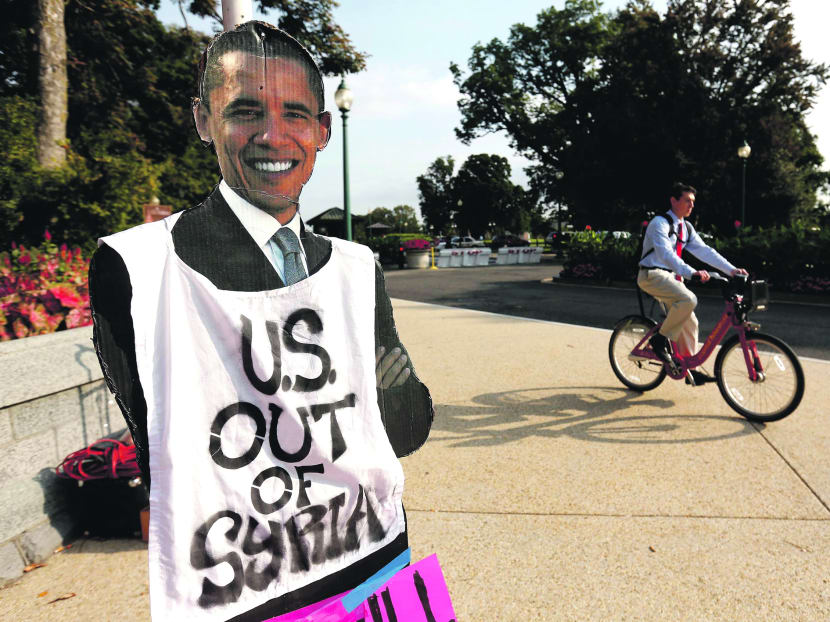Obama’s agenda at risk in Congress vote
WASHINGTON — United States President Barack Obama yesterday began one of the most pivotal weeks of his presidency, as he makes a final push to persuade Congress and the American public to support air strikes against Syria.

Members of the Code Pink activist group protested against potential US military action in Syria at the US Capitol in Washington yesterday. The majority of the American public is against Congress authorising the strike, according to a CNN poll. Photo: Reuters
WASHINGTON — United States President Barack Obama yesterday began one of the most pivotal weeks of his presidency, as he makes a final push to persuade Congress and the American public to support air strikes against Syria.
With US lawmakers increasingly lining up against the President, the looming congressional vote — which could take place as early as Wednesday (Thursday, Singapore time) in the Senate— threatens to undermine Mr Obama’s domestic agenda and weaken his clout internationally.
The Senate was in session yesterday for the first time since the August recess. It is expected to vote by the end of the week. The House of Representatives will not take up the proposal until the week of Sept 16.
Mr Obama will make his case for the strike to punish Syria — for a gas attack the US blames on Syrian government forces — in a speech from the White House tomorrow, an administration official said. He was also due to appear on several television interviews yesterday.
The US says more than 1,400 people were killed in a suspected chemical weapons attack near Damascus on Aug 21. Mr Obama is seeking to punish Syria for the attack.
In an interview with the CBS television network due to be aired yesterday, Mr Assad denied involvement in the attack.
The proposed US strike is unlike anything that has come before — an attack inside the territory of a sovereign country, without its consent, without a self-defence rationale and without the authorisation of the United Nations Security Council, and for the purpose of punishing an alleged war crime that is already over rather than preventing an imminent disaster.
A failure in Congress could reverberate through Obama’s second-term agenda, heightening the difficulty he will face in winning congressional support for domestic initiatives and hampering his foreign policymaking during his final three years in office.
Russia said yesterday it would urge Syria to put its chemical weapons arsenal under international control if this would avert military strikes. Foreign Minister Sergei Lavrov, who called a news conference to announce the proposal, said he had already conveyed the idea to Syrian Foreign Minister Walid Al Moualem at talks in Moscow and that Russia expected “a quick and, I hope, a positive answer”.
Earlier yesterday, US Secretary of State John Kerry said that Mr Assad could avoid a US strike by surrendering all his chemical weapons within a week, but immediately made clear he was not making a serious offer. The State Department later said Mr Kerry had been making a rhetorical argument about the impossibility of Mr Assad turning over chemical weapons.
In the interview with CBS, Mr Assad said the US would be going against its own interests if it got involved in Syria, warning of repercussions. The Syrian leader, who has accused the rebels of carrying out the poison gas attack, said that if there were US strikes on Syria, the US “should expect everything”.
Russian President Vladimir Putin, Mr Assad’s only big-power supporter, said opponents of the Syrian President staged the attack to provoke US-led military intervention, an allegation Mr Kerry dismissed out of hand yesterday.
Mr Assad also told CBS that Syrian troops were not in the region where the attack occurred. “In the area where they said the government used chemical weapons, we only had video,” he said. “We only have pictures and allegations. We’re not there. Our forces, our police, our institutions don’t think this.” AGENCIES






